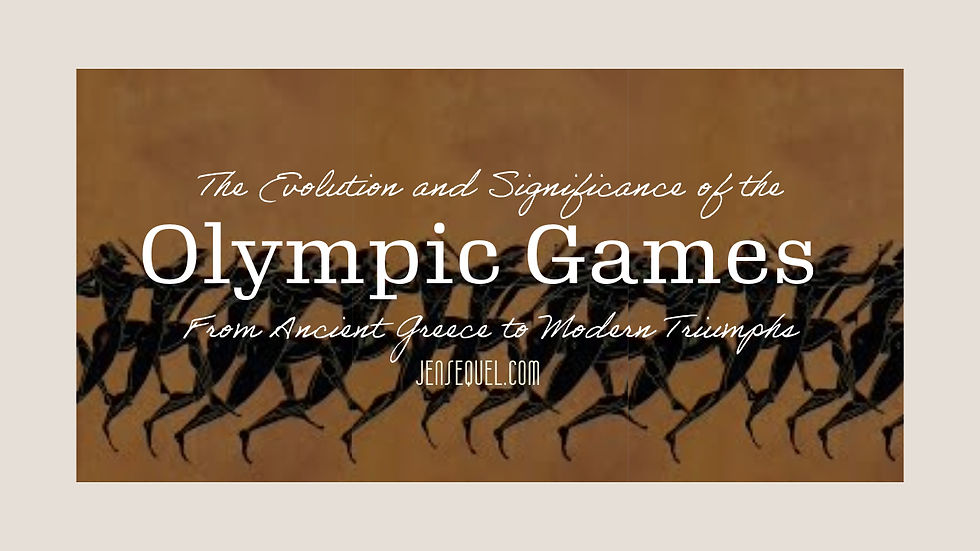Lughnasadh: A Celebration of Harvest and the God Lugh
- Jen Sequel
- Aug 1, 2024
- 3 min read
Updated: Aug 2, 2024

History of Lughnasadh
Lughnasadh, pronounced "LOO-nah-sah," is one of the four major Gaelic seasonal festivals, alongside Samhain, Imbolc, and Beltane. Celebrated on August 1st, Lughnasadh marks the beginning of the harvest season and is named after the god Lugh. This ancient festival has roots in pre-Christian Ireland and was historically observed by various Celtic tribes, including the Irish, Scottish, and Manx.
Lughnasadh's origins are deeply entwined with agricultural practices. It was a time to give thanks for the first fruits of the harvest, particularly grains, and to seek blessings for continued abundance. The festival was characterized by communal feasting, athletic competitions, trading fairs, and religious ceremonies.

One of the key historical sites associated with Lughnasadh is the hill of Teltown in County Meath, Ireland. It was here that the Teltown Games, similar to the Olympic Games, were held. These games featured athletic contests, horse racing, music, storytelling, and crafts. Marriages and legal matters were also often arranged during this time, reflecting the festival's importance as a social and economic event.
The God Lugh: A Multifaceted Deity
Lugh, also known as Lugh Lámhfhada (Lugh of the Long Arm), is a prominent figure in Irish mythology. He is often associated with the sun, light, and skilled craftsmanship, embodying a blend of warrior, king, and savior archetypes. Lugh's importance in the Celtic pantheon is highlighted by his title Samildánach, meaning "the many-skilled" or "many-gifted."
Origins and Mythology

Lugh's parentage is of great significance in Celtic mythology. He is the son of Cian of the Tuatha Dé Danann and Ethniu, daughter of the Fomorian leader Balor. This union represents a symbolic merging of two rival factions. According to legend, Lugh was prophesied to overthrow his grandfather Balor, a prophecy that came true when Lugh killed Balor in the Battle of Magh Tuireadh, securing victory for the Tuatha Dé Danann and establishing himself as a heroic figure.
Attributes and Skills
Lugh is celebrated for his extraordinary talents and versatility. He is a master of many crafts, including blacksmithing, carpentry, poetry, healing, and warfare. This multifaceted nature is why he is often depicted as the quintessential Renaissance man of Celtic mythology. His long arm symbolizes his far-reaching influence and capabilities.
The Festival of Lughnasadh
Lughnasadh is directly linked to Lugh through its name and the activities performed during the festival. According to myth, Lugh established the festival in honor of his foster mother, Tailtiu, who died of exhaustion after clearing the plains of Ireland for agriculture. Thus, the festival also serves as a commemoration of Tailtiu’s sacrifice.
During Lughnasadh, people would offer the first fruits of the harvest to Lugh and Tailtiu. Feasting on freshly harvested grain, berries, and other produce was a central aspect of the celebration. Athletic competitions and games, echoing Lugh's prowess and skills, were held to honor his memory and invoke his blessings for a bountiful harvest.
Modern Celebrations

While the specific practices of Lughnasadh have evolved over time, the festival is still celebrated today by those who follow modern Pagan and Celtic traditions. Contemporary observances often include rituals that honor the cycle of the seasons and the importance of community and gratitude.
Many modern Pagans celebrate Lughnasadh by baking bread from the first grain of the season, hosting communal feasts, and performing rituals to honor Lugh and Tailtiu. Festivals, fairs, and games continue to be popular, reflecting the historical importance of Lughnasadh as a time of joy, community, and thanksgiving.
Lughnasadh stands as a testament to the rich agricultural heritage and mythological traditions of the ancient Celts. Celebrated as both a harvest festival and a tribute to the god Lugh, it encapsulates the values of gratitude, community, and skilled craftsmanship. By honoring the past through these vibrant traditions, modern celebrants keep the spirit of Lughnasadh alive, fostering a connection to the land and the cycles of nature.
If you liked this article, you may also like my Incredibly Strange & Completely Random Holidays! Simply log into you Amazon account and start reading free!






Comments